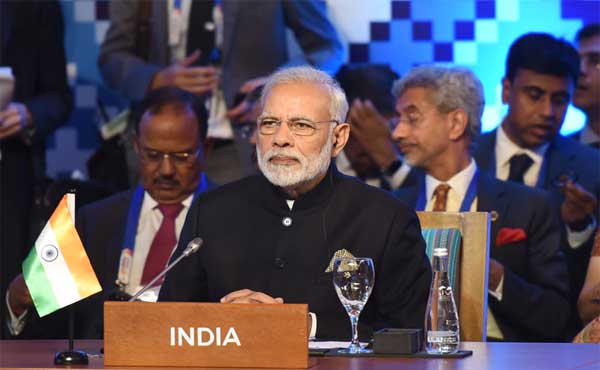Manila, Nov 14 (IANS) Backing a rules-based regional security architecture, Prime Minister Narendra Modi on Tuesday favoured India and the Asean grouping coming together for a joint fight against terrorism and violent extremism.
He also said India’s Act East Policy is shaped around the Asean and its centrality in the regional security architecture of the Indo-Pacific region is evident.
“We have individually strived very hard to fight terrorism and violent extremism. It is time that we jointly address this challenge by intensifying cooperation in this crucial area,” Modi said, addressing the 15th India-Association of Southeast Asian Nations (Asean) Summit here attended by leaders of Brunei, Cambodia, Indonesia, Laos, Malaysia, Myanmar, Singapore, Thailand and Vietnam besides host Philippines.
This year marks the 25th anniversary of the India-Asean dialogue partnership and the 50th anniversary of the formation of Asean.
“Asean’s remarkable journey is indeed worthy of reflection as much as it is of celebration,” Modi said.
“On this historic occasion, I am confident that Asean will further resolve to work together with one vision, one identity and as one independent community.”
The Prime Minister said that India’s Act East Policy is “shaped around the Asean, and its centrality in the regional security architecture of the Indo-Pacific region is evident”.
“Our wide-ranging agenda of cooperation under the Third Asean-India Plan of Action has progressed well covering the three crucial pillars of politico-security, economic and cultural partnership,” he stated.
“Maritime links established thousands of years ago between India and Asean countries have enabled our trade relations in the past and we have to work closely to further strengthen them.”
Modi assured Asean of India’s support towards achieving a rules-based regional security architecture that best attested to the region’s interests and its peaceful development.
He concluded by saying the 1.25 billion people of India were keen to welcome the Asean leaders as the chief guests at next year’s Republic Day Celebrations.
Earlier in the day, Modi addressed the 12th East Asia Summit, a premier forum of the Asean member states and eight other countries.
“We look forward to the East Asia Summit attaining greater salience in years to come,” he said in his remarks.
“I reiterate my commitment to work with you to address the political, security and economic issues of the region.”
Leaders of the 10 Asean member states and of Australia, China, India, Japan, New Zealand, Russia, South Korea and the US hold this annual summit.
The forum provides an opportunity for the leaders to exchange views and assess international issues of concern, including traditional and non-traditional security threats, primarily terrorism, maritime cooperation and security and non-proliferation.
Following the East Asia Summit, four outcome documents were released: on countering ideological challenges of terrorism, terrorist narratives and propaganda; on anti-money laundering and countering financing of terrorism; on cooperation in poverty alleviation; and on chemical weapons.
Modi also attended a meeting of the leaders of the proposed Regional Comprehensive Economic Partnership (RCEP).
RCEP is a proposed free trade agreement between the Asean member states and the six states with which grouping has free trade pacts – Australia, China, India, Japan, South Korea and New Zealand.
Briefing the media, Preeti Saran, Secretary (East) in the Ministry of External Affairs, said that Modi reiterated India’s support for a balanced RCEP.
The Prime Minister started Tuesday by holding bilateral meetings with the leaders of Australia, Vietnam, Japan, Brunei and New Zealand.
Modi arrived here on Sunday on a three-day visit to the Philippines, the first prime ministerial visit to this country in 36 years since the visit of Indira Gandhi in 1981.
On Monday, he also held bilateral meetings with US President Donald Trump and Filipino President Rodrigo Duterte.
